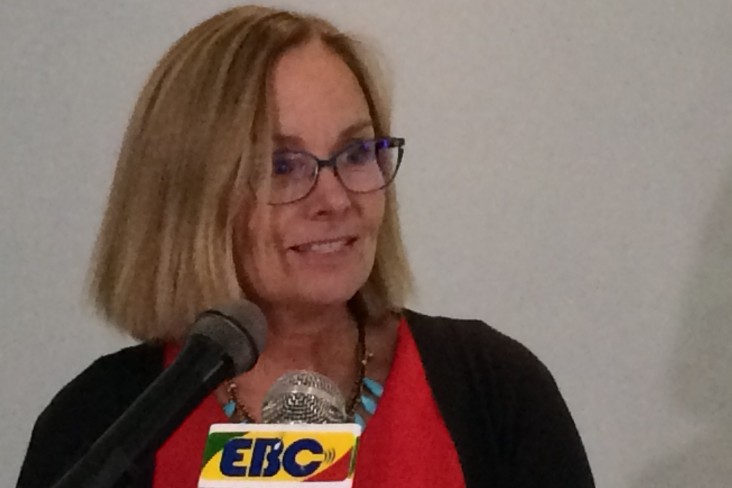
Unfortunately, Ambassador Haslach could not make it. She sends her regrets and greetings. I have to say, it is an honor to be in a room with so many humanitarians to mark World Humanitarian Day.
I say “mark” because today is a day of many things….
Today, through the moment of silence, we mourned and honored those who have given their lives to serve humanity. We remember those who lost their lives in that horrific attack 13 years ago today on the UN Headquarters in Baghdad and the approximately 1,000 humanitarians who have been killed in the line of duty over the past decade. We mark this day so that we do not forget them.
In their honor, we must also celebrate what they, and millions of other humanitarians around the world, have sacrificed and accomplished over the years on behalf of humanity. We celebrate what we can accomplish when we all work together, when we pool our resources for the common good.
Today, we must also remind ourselves that whatever nation, whatever faith, and whatever background we come from, we have a shared humanity. This year’s theme—‘One Humanity’—speaks to our common bond, our common obligation and our common commitment as human beings to look out for each other. To help those in need. To listen to each other.
We’ve seen in recent weeks that people here in Ethiopia want to be heard. I would like to urge everyone—both within the Government and on the streets—to find peaceful ways to talk to, and listen to each other. No one should ever die for peacefully voicing his or her opinion.
As we stand here in Addis Ababa and look back at the past year, we see how our countries and our organizations stood together to ensure that the people of Ethiopia did not have to suffer the worst effects of the drought.
Together, we have helped to provide relief food assistance to more than 10 million people, while also supporting the PSNP to provide for approximately eight million more. The costs and effort to do this have been tremendous, but when we see a mother who is now able to feed her children and send them to school because of what we all are doing, we know it is worth it.
And while we can be proud of what we’ve accomplished together, we’re not through this yet. It may be raining these days, but we have to remind ourselves that this is the lean season—even in the good years. Our work is certainly not finished.
On that note... if you’ll allow me, I’d like to use this occasion to announce that the United States has committed a further 35 million dollars for USAID to work with partners like WFP, OCHA, FAO and others of you here in the room to help Ethiopians meet immediate needs, protect gains made, and complement long-term efforts to build resilience to an ever-changing climate.
This brings the total U.S. humanitarian support to the people of Ethiopia in the last two years to nearly 774 million dollars. The Europeans—especially the United Kingdom, Germany and Sweden—as well as the Canadians, Japanese and Australians have also donated very generously. And, of course, the Ethiopian Government has allocated approximately 380 million dollars to the drought response. We have all made helping the Ethiopian people a top priority.
I’m happy to say that through our joint efforts to get seeds out to those who needed them most, crops are now growing. And while it takes time for those seeds to grow, it takes even longer for families to recover, to begin building up their assets again. That will be our next group effort: Helping families to get back on their feet and to become more resilient so that the next time there is a drought—and we are fairly certain there will be a next time considering the cyclical droughts which affect the Horn of Africa—Ethiopian families will be in better shape to get through it.
At the same time, and possibly lost in all of the coordination and discussions going on about the drought response, we must also recognize how the Government and the people of Ethiopia have shown their humanity by hosting more refugees than any other country in Africa. Ethiopia is currently providing a safe place to live for nearly 750,000 people from neighboring countries. This tremendous effort and the generosity of the Ethiopian people and the international community to support this effort show how we all share ‘One Humanity.’
I’d like to close by sharing something U.S. President Barack Obama said, and I think we can all agree: “The best way to not feel hopeless is to get up and do something. Don’t wait for good things to happen to you. If you go out and make some good things happen, you will fill the world with hope, you will fill yourself with hope.”
Thank you.
See also
Mission Director Remarks World Humanitarian Day 8-19-16 [PDF, 145 kb]
Press Release Additional Humanitarian Assistance Funding for Ethiopia 8-19-16 [PDF, 81 kb]
USAID Ethiopia Working in Crisis and Conflict







Comment
Make a general inquiry or suggest an improvement.